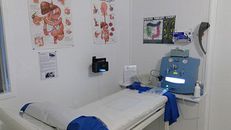What is Colon Irrigation?
Colon irrigation is a method of cleansing the digestive system that involves flushing faecal matter and toxins from the colon with purified, temperature-controlled water. The therapist, also known as the colon hygienist, inserts a tiny disposable tube into the client's rectum through which large amounts of water are introduced into the colon. An abdominal massage is then performed on the client to loosen up and release hard stools along with the water.

What are the Benefits of Colon Irrigation?
Colonic irrigation is highly relaxing, and it leaves you feeling clean, energised and light. A great tool for strengthening the large intestine and improving the digestive system, this detoxification method aids in a range of conditions, including:
- Constipation
- Bloating
- Flatulence
- Diarrhoea
- Irritable bowel syndrome
- Stress
- Headaches and migraines
- Back pain
- Eczema, psoriasis and other skin problems
- Haemorrhoids
- Anxiety
- Depression
- Allergies
- Parasitic infections
- Bowel cancer
- Diverticulitis
How Much Does Colon Irrigation in Brisbane Cost?
A colon irrigation session in Brisbane costs anywhere from $115 to $150, depending on length of treatment and whether you would like additional services. There are clinics that offer colonic treatments bundled with other services like nutrition and lifestyle counselling. This will also affect the price of the service.
How Many People in Brisbane Practise Colon Irrigation?
The majority of them run their own private clinics and also specialise in other natural therapies such as naturopathy, massage therapy or reflexology, among others. Additionally, some practitioners are closely affiliated with integrative health practitioners.
What is the Demand for Colon Irrigation in Brisbane?
The use of colon irrigation is common in Brisbane as part of detoxification programmes. There are many reasons why people use it, including boosting energy levels, getting clearer skin and losing weight. Additionally, research shows a high prevalence of colonics among people who have undergone surgery, particularly hip or knee replacement, and who suffer constipation resulting from a change in diet and analgesic administration.













































